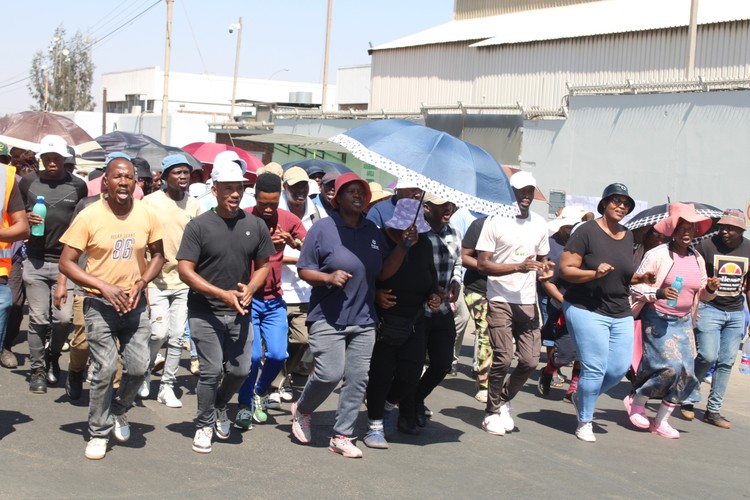Premier Group goes to court to end Mister Sweet strike
Strike at Germiston factory enters fourth week
Hundreds of workers at Premier Group’s Mister Sweet factory in Germiston continue to strike for the fourth week. Premier Group is seeking a court interdict against the striking workers. Photo: Kimberly Mutandiro.
- Premier Group last week filed an urgent application at the Labour Court to bring an ongoing strike to a halt.
- The application, to be heard on Tuesday, will be opposed by the Simunye Workers Forum.
- The strikers have reduced their wage demands, but the employer has not budged from a 7% increase offer.
An urgent application to stop workers from striking at the Mister Sweet factory in Germiston, was filed by the Premier Group at the Johannesburg Labour Court on Wednesday last week.
The giant company is also asking the court to interdict workers from colluding with third parties to engage in any act of intimidation or violence against workers who not participating in the strike, which has been going on since 19 August.
Simunye Workers Forum, which represents the majority of the workers, intends to oppose the application.
The workers are asking for the salaries of lowest paid workers be doubled from R6,000 to R12,000 per month, with R7 per hour increases for higher-paid workers. It appears the company has not budged from a 7% wage increase during negotiations over the past weeks.
Simunye Workers Forum organiser Jacob Potlaki said he hoped the court would find in favour of the workers. He said the strike had not been easy for the workers, and the forum had been receiving support from well-wishers to pay for their food and transport.
Meanwhile, 23 organisations from six provinces released a statement on 6 September in solidarity with the striking workers, and called for a boycott of Mister Sweet products.
In the statement, the organisations, involved in housing, law, and labour, stated: “The Pietermaritzburg Economic Justice and Dignity’s Household Affordability Index for August 2024 puts the cost of a basic food basket a month at R5,227.14. With just R6,000, workers must struggle to pay for food, transport, healthcare, education, and everything else. The wages that the Mister Sweet bosses pay the workers condemn them to poverty”.
The organisations also condemned allegations of threats, underhanded tactics, stubbornness, and arrogance by the company against the workers, and accused the company of making large profits at workers’ expense.
One worker who works as a machine operator said he joined the company in 2016 and worked for R12 an hour on three-month contracts until 2019 when he was given permanent employment. But, he said, said his salary had not increased, which is why he and other workers decided to embark on the current strike.
A woman who has been a packer in the company for four years said packers pack up to 16 pallets of sweets per day. However, she says, she does not earn enough to look after herself and her three children. “The work we do is too much; I deserve at least R10,000 per month.”
Premier’s spokesperson Siobhan O’Sullivan declined to comment, referring GroundUp to a previous statement in which Premier said the worker’s demands were “unrealistic” and the company would retain its 7% offer.
Support independent journalism
Donate using Payfast

Don't miss out on the latest news
We respect your privacy, and promise we won't spam you.
Next: At least 116 children died from malnutrition in the Eastern Cape in one year
Previous: Villagers use contaminated river water while R100-million sewage project delayed
© 2024 GroundUp. This article is licensed under a Creative Commons Attribution-NoDerivatives 4.0 International License.
You may republish this article, so long as you credit the authors and GroundUp, and do not change the text. Please include a link back to the original article.
We put an invisible pixel in the article so that we can count traffic to republishers. All analytics tools are solely on our servers. We do not give our logs to any third party. Logs are deleted after two weeks. We do not use any IP address identifying information except to count regional traffic. We are solely interested in counting hits, not tracking users. If you republish, please do not delete the invisible pixel.

